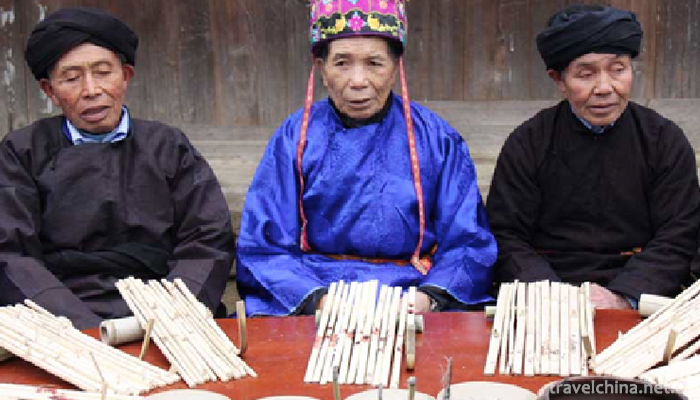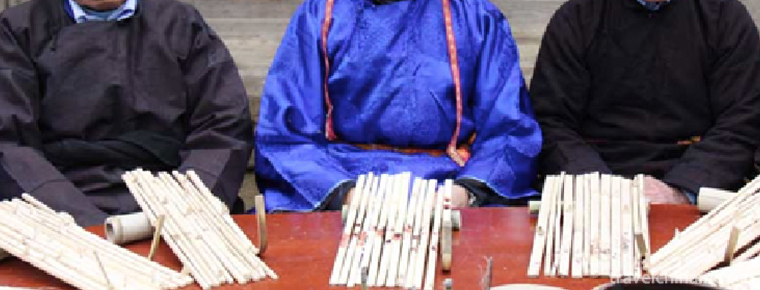Miao Jia Li
Miao Jia Li
Jiali, Miao is called "jaxlil". In the context of Miao language, "Jiali" is a synthesis of the semantics of "philosophy", "truth", "reason" and "jurisprudence" in Chinese. The concepts of Jia Jing, Jia Zheng, Jia Li, Jia Shi and Jia Yi not only illustrate the richness and variety of Jia Li's cultural content, but also reflect the extensive and profound cultural heritage of Miao nationality. It integrates ancient Miao literature, history, philosophy, law, linguistics, folklore, natural science, witchcraft and so on. It is the "encyclopedia", "Bible" and "code" of ancient Miao society. Jiali has the cultural characteristics of the integration of philosophy, religion, legal spirit and human ethics. Jiali is the most sacred spiritual and cultural code of Miao.
In June 2008, the Miao Jiali declared in Qiandongnan Miao and Dong Autonomous Prefecture of Guizhou Province was listed in the second batch of national intangible cultural heritage list with the approval of the State Council.
historical origin
Miao villagers in Taichen Village, Xingren Town, Danzhai County, Guizhou Province, gathered together to learn the traditional Miao culture "Jiali" in winter.
Jiali is called "encyclopedia" of ancient Miao society. It is a traditional culture imparted by the Miao people. It is the most important and representative intangible cultural heritage left by the Miao people's ancestors to future generations. It is a comprehensive integration of Miao literature, history, philosophy, law, folklore, natural science, witchcraft and linguistics. It gathers almost all the artistic techniques of Miao folk literature and is a wonderful flower in Miao folk literature and art. In 2007, the Miao oral classic "Jiali" was included in the second batch of national intangible cultural heritage list.
primary coverage
Jia Li
Jia Li, widely used in the Miao dialect area of Eastern Guizhou, is an ancient rule formed by the Miao people in the history to safeguard the stability and development of the Miao society by discussing (planting rocks) legislation, regulating the old people's judicature and enforcing the law by drum clubs.
Jiali, Miao is called "jaxlil". In the context of Miao language, "Jiali" is a synthesis of the semantics of "philosophy", "truth", "reason" and "jurisprudence" in Chinese. It can be said that Jia Li has the cultural characteristics of the unity of philosophy, religion, legal spirit and ethics. Jia Li is the most sacred spiritual and cultural code of Miao nationality.
Jiali Culture is a civilized complex of Jiali Code, Jiali Ritual and the whole social ecology of Jiali. When referring to Jiali culture, it often refers to the whole space of Jiali culture. The concepts of Jia Jing, Jia Zheng, Jia Li, Jia Shi and Jia Yi not only illustrate the richness and variety of Jia Li's cultural content, but also reflect the extensive and profound cultural heritage of Miao nationality. The Miao Jiali culture is mainly inherited in southeastern Guizhou, southern Guizhou and Northern Guangxi.
Jia Jing
Jia Jing - Jia Li's Sutra, which is acknowledged by Miao people in the cultural space of Jia Li, is handed down from generation to generation. Jia Jing includes all the classical texts of Jia, a traditional oral style, which were translated into Chinese in the past as Jia, Li Ci, Li Ci, and Gu Li Gu Ci. It also includes Li Ge, Yan Gu Jing, and the sacrificial classics used by divine judgement, which are similar to Jia's style, content and structure, although they are not called Jia. ". Artistically, Jia Jing generally pays attention to harmony in rhyme, neatness and antithesis, and does not talk about general reason, but consists of one or several Jia allusions. Jia Jing is an ancient classic mastered by elder Jia Li, a traditional cultural elite of Miao society, rather than an encyclopedia popular among ordinary Miao people.
Jia case
Jia Zheng - Jia Li's classic cases and examples. The Miao Jia case was called "Miao case" after it was approved by the Central Dynasty legal system in the Qing Dynasty. The Law of the Great Qing Dynasty stipulates that "all the disputes between Miao people and Miao people in Miaojiang area should be settled according to Miao cases, and no official law should be brought to justice". Jia Jing said, "Continuation is thousands of ancient principles, inheritance is thousands of ancient rules." It can be seen that Jia Li's allusions are passed down from generation to generation. In the past, when Jia Shi narrated a classical case of Jia Li, he often did this opening remark: "Jia Li has risen in ancient times, and Jia Li formed early in ancient times. Let's listen to a story and recite a story. The structure of a single and complete case consists of four parts: speech, allusion, warning and conclusion. This is also the most basic stylistic feature of Jiali's classics.
Inheritance significance
In the traditional Miao society, the Rong Society organizes legislation on the basis of Jiali , justice on the basis of Jiali, public affairs and law enforcement on the basis of Zhailao or Guzangtou, and sacrifices and prayers on the basis of Jiali by wizards. In the field of social management, the constitution of the Miao people in the form of Jiali has the Supreme authority.
The contents of Jiali vary from place to place, but they all start with the creation of heaven and earth, the transportation of gold and silver, the casting of the sun and moon, the shooting of the sun and the moon, the invitation of the sun and the moon, the laying of eggs, ghosts and human ancestors, and then with the method of fighting between the human ancestors and Leigong, resulting in floods inundating the land. After the flood subsided, brothers and sisters had no choice but to get married, and human beings were able to breed, followed by population pressure or ethnic disputes, and the great migration of Miao ancestors... Each branch has been relocated from place to place. These historical legends about the origin and destiny of the Miao nationality are not only the basis for ethnic identity, but also the basis for the generation and inheritance of Jiali.
"Jiali of Miao Nationality" remembers the history and culture of Miao Nationality and belongs to folk literature. Its connotation goes far beyond the category of folk literature. It is a classic masterpiece of oral ancient books. It is a comprehensive integration of ancient Miao literature, history, philosophy, law, linguistics, folklore, witchcraft and natural science. It is called "encyclopedia", "Bible" and "code" of ancient Miao society. It reflects the world outlook, ethics and values of the ancient Miao people.


-
1.Kung Pao Chicken
Kung pao chicken is a famous traditional Chinese and western famous dish
Time 2018-10-12 -
2.Hakka stuffed tofu
Hakka-brewed tofu, also known as minced meat-brewed tofu and Dongjiang-brewed tofu, is one of Hakka's famous dishes and is said to be related to...
Time 2018-11-02 -
3.Karamay River Scenic Area
The Karamay River, also known as the Chuancheng River, originates from Jiulongtan in the northeast of the city. It zigzags through the Xiyuetan Reservoir (also known as Aikule)
Time 2018-12-23 -
4.Jiankou Great Wall
The Great Wall is located in Badaohe Township, northwest of Huairou District, Beijing suburb. It is 1141 meters above sea level and about 30 kilometers away from Huairou County.
Time 2019-01-21 -
5.Xishan Scenic Area Kunming Yunnan
The Xishan Scenic Area in Kunming, Yunnan Province, is a forest park with ups and downs, verdant trees, white birds contending and beautiful scenery. Dense forest vegetation
Time 2019-02-25 -
6.Eyebrow household
Eyebrow households, distributed in Shanxi, Shanxi, Shaanxi, Gansu, Western Henan and other provinces, also known as "Eyebrow Shao" or "confusion", are named for their euphemistic m
Time 2019-05-31 -
7.Pottery Firing Techniques
Pottery refers to the clay as the body, processed and shaped by hand, wheel system, moulding and other methods, and baked at high temperature of 1000-1200 degrees or so. The production process of pott
Time 2019-06-18 -
8.the Wu Ballads
Wuge is the oral literary creation of the majority of the people in Wu dialect area, which originated in southeastern Jiangsu Province, and Suzhou is the central area for the generation and developmen
Time 2019-06-29 -
9.Yangge Dance
Yangge is a popular and representative folk dance genre in China (mainly in the northern region). There are different appellations and styles in different regions. In folk, there are two kinds of appe
Time 2019-07-10 -
10.Yongxin Drum
Yongxin Xiaogu is one of the traditional operas in Ji'an City, Jiangxi Province, which originated from Taoism. Legend has it that it was formed in Yongxin, Jiangxi Province during the reign of Qingdao
Time 2019-07-14 -
11.Zhangzhou Puppet Head Sculpture
Zhangzhou puppet head carving is a traditional folk arts and crafts in Zhangzhou City, Fujian Province. It belongs to a special skill in the production of puppet stage props. Zhangzhou puppet head car
Time 2019-07-25 -
12.Warm tips for Chengdu Giant Panda Base
Giant pandas live in dense bamboo forests at an altitude of 2600-3500 meters. The annual temperature is lower than 20 ℃ and likes cold and afraid of heat. When the weather is cool, the giant panda will carry out activities in the outdoor playground. When the outdoor
Time 2020-12-13